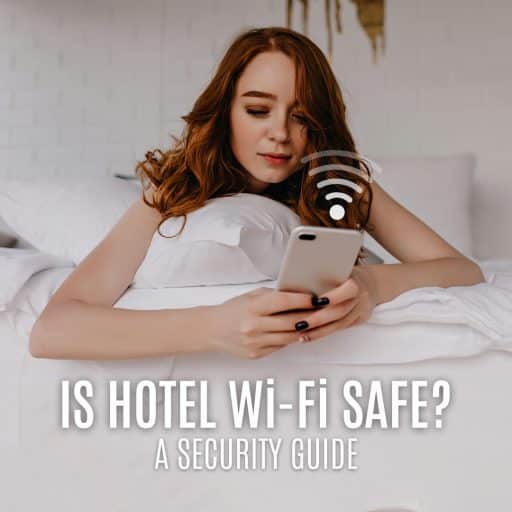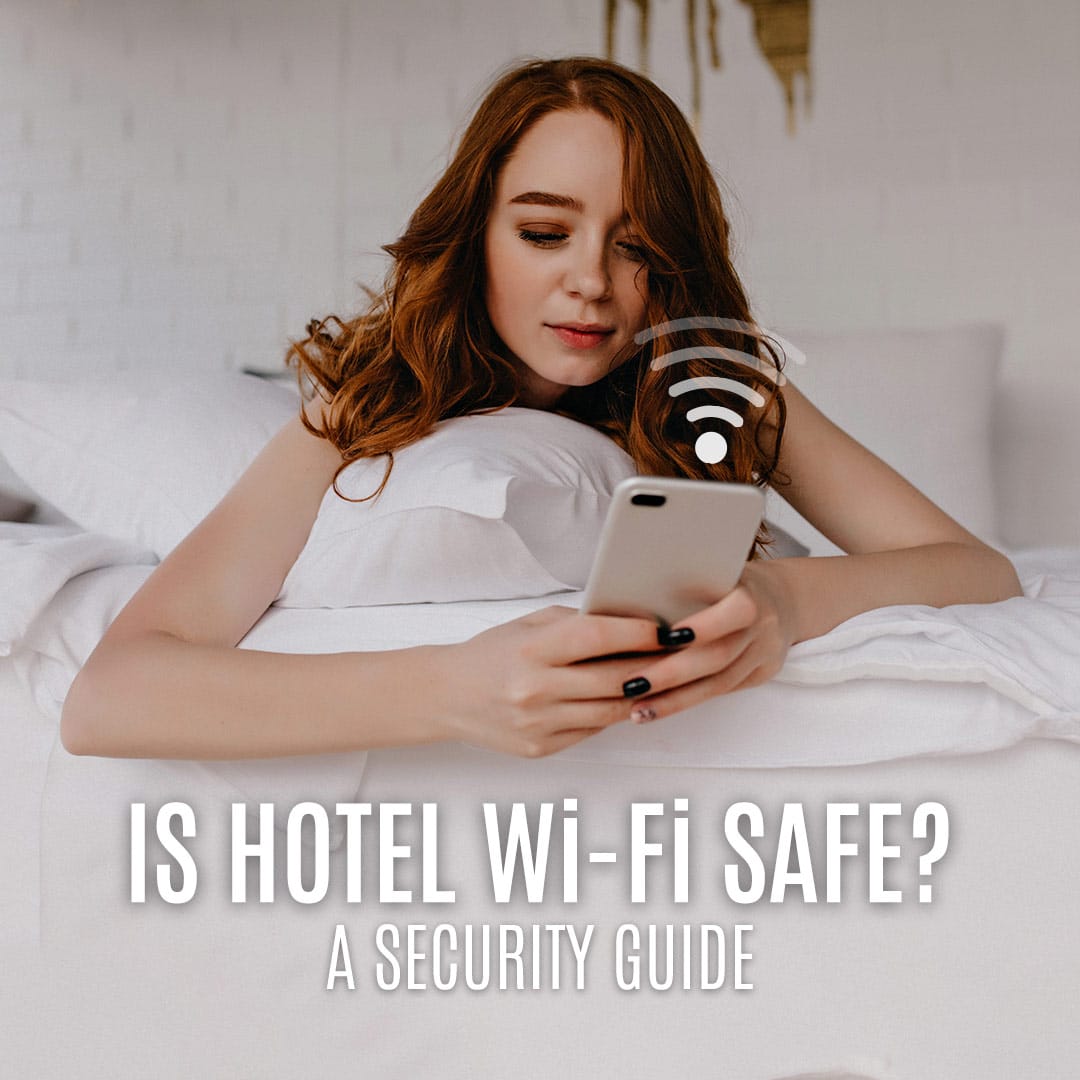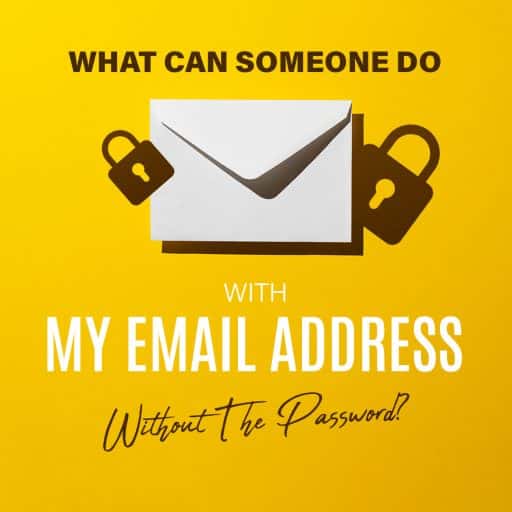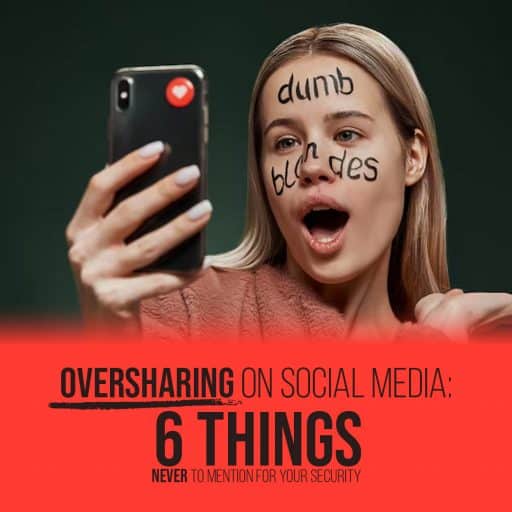Free WiFi is a helpful perk that you’ll find at most modern hotels. However, the WiFi at your hotel might not have the right security measures in place to protect your privacy and stop unauthorized access to your personal information.
Before you log onto the hotel network, make sure you know how to spot key weaknesses that could leave you vulnerable to cyberattacks. We’re here to help you find those weaknesses and protect yourself anytime you’re online.
Read below to learn how safe hotel WiFi is and how to get help if you find yourself the victim of an internet scam or cyberattack.
What Are the Risks of Using Hotel WiFi?
When you use hotel WiFi, make sure you’re aware of the risks. Here are some of the biggest reasons to be cautious when using the free network at a hotel:
Unencrypted Networks Aren’t Safe
An unencrypted network doesn’t use security measures like WPA or WPA2 to protect the data you send from your connected device. That means when you use an unencrypted network, it’s much easier for cybercriminals to see what you’re doing and get access to sensitive data like photos and passwords.
Malware Can Spread on Hotel WiFi
Cybercriminals know how to exploit the weak spots in an unencrypted WiFi network, and they use these weaknesses to spread malware — software that gives them unauthorized access to your computer. Scammers can use malware to find sensitive data, which they can then use to blackmail you. This traumatic experience is sadly something thousands of people go through every year.
Rogue Hotspots
One common tactic scammers use is setting up a hotspot with the same name as a hotel’s WiFi network. Once you’re connected to this hotspot, a cybercriminal can use malware to hijack your device. The best way to avoid this trick is to steer clear of hotspots altogether while staying in a hotel and read network details carefully before connecting.
Point-of-Sale Attacks
Scammers and hackers often use malware to attack hotel point-of-sale systems, which store guests’ credit card numbers and other sensitive information. Unfortunately, the hotel is responsible for protecting guests from these attacks.
One of the best ways to protect yourself from point-of-sale security breaches is to pay for your stay with cash. If that’s not an option, you can request the hotel remove your card data from their POS system after your stay for security reasons.
How Can You Protect Yourself on Hotel WiFi?
We always recommend taking as many precautions as you can when logging into a hotel’s WiFi network. These are some of our favorite ways to protect your data without staying offline altogether while traveling.
Use a VPN
A virtual private network (VPN) encrypts your internet traffic, making using unencrypted hotel WiFi much safer. A VPN also masks your device’s IP address, keeping your identity and location as safe as possible. With a VPN, cybercriminals won’t be able to see that your device is connected to a hotel network, so you can browse the web without fear.
Turn Off File Sharing
File sharing is a common “in” used by scammers and blackmailers on hotel networks. The server message block (SMB) protocol, file transfer protocol (FTP), and other network protocols can spread malware through file sharing. Still, you can protect yourself from these attacks by disabling any form of file sharing on your device.
Use Your Cell Data
If you need to make a payment from a hotel, we recommend using either a VPN or cellular data. Relying on your cell carrier for internet access keeps you off the hotel’s unsecured WiFi network, protecting your payment information. We also always encourage our clients to stay off of hotel WiFi when logging into bank accounts, email, or social media for extra security; use your cellular data for these pages instead.
Enable HTTPS
Hypertext transfer protocol secure (HTTPS) is a network protocol that protects the information transferred between your web browser and a website. This form of encryption stops cybercriminals from stealing data from your devices when you use the internet. Some sites use HTTPS or SSL (secure socket layers) for encryption, while others use the older HTTP (hypertext transfer protocol), which is less secure.
What Blackmail Tactics Do Scammers Use?
Scammers attack hotel networks from multiple angles, and they’re always looking for new ways to steal your data and use it against you. Our 24/7 team of cybercrime investigators has seen it all and gained a deep understanding of scammers’ tactics. These are some of the strategies that cybercriminals use to threaten you when you’re logged into a hotel network.
Sextortion Scams
Cybercriminals often take advantage of the most sensitive data they steal from your devices. If you have compromising photos or videos on your phone, tablet, or computer and connect to an unsecured hotel network, scammers can steal these files and use them as the basis for blackmail.
Ransomware
Scammers can also use malware to lock down your device and demand a ransom to get access back. Our clients have told us that dealing with ransomware is one of the most frustrating and frightening experiences in their lives. Many people pay the ransom immediately out of fear, but that’s never the way to respond to cyber-blackmail. Instead, turn to a professional team for help.
Data Breach Threats
When scammers get access to your data, they don’t always go after compromising content. Cybercriminals often also threaten to release sensitive data like passwords, addresses, and more online if you don’t pay a ransom. This is another situation when you don’t want to give the scammer what they want. Get professional help navigating the situation instead.
Why Do You Need To Protect Your Data on Hotel WiFi?
If you’ve never been the victim of a cyberattack, it’s easy to wonder how bad they can be. Sadly, cyber scammers and blackmailers can turn your life upside down when you use vulnerable, unsecured networks. As you now know, hotel WiFi is far from secure in most cases, and scammers often take advantage of its weaknesses.
You need to protect your sensitive data when you use hotel WiFi because criminals can use it against you in horrifying ways. We’ve helped countless scam victims get the help they need, but the emotional hardship that cybercrime can cause often sticks around after the situation is taken care of.
That’s why we work so hard to advocate for responsible web browsing — we’ve seen the harm a scam can do, and we want to do whatever we can to keep you from experiencing that pain.
What Can I Do If I’m Scammed Online?
If you’ve been scammed, you’re probably feeling confused, angry, scared, sad, and more — a complicated mix of emotions that makes it hard to move slowly and make wise decisions. It takes a toll on your mental health, distracts you from what matters most to you, and can make you feel powerless. That’s why we offer help to victims of cybercrime.
The Digital Forensics team works 24/7 to help you and the authorities catch the scammer who turned your life upside down and bring them to justice. We use advanced techniques like IP tracking and data analysis to track down blackmailers as fast as possible. We can either provide help and support ASAP, delivering a detailed forensic report within 24 hours, or be on your team for an extended 30-day period.
Offering Support in a Crisis
When you experience a scam or are blackmailed, it’s a true crisis situation. The crime can affect everything from your financial security to your reputation.
Our team stands by your side as you weather the storm, giving you back your confidence and collaborating with law enforcement to get you out of this terrible situation. We take cybercrime — and your mental health — extremely seriously, and we won’t rest until you can have peace of mind again.
Helping You Not Get Scammed Again
Many of our clients express fears of falling prey to another scam, and we completely understand. That’s why we offer guidance and insight to prepare you to avoid future threats.
We can help you tighten up your security measures and educate you about the telltale signs of a scam, equipping you to cover your digital tracks and protect yourself in the future.
The Bottom Line on Hotel WiFi and Scams
If you travel often, you probably use hotel WiFi often. That’s not necessarily a problem as long as you equip yourself with the knowledge and protection you need to avoid cyberattacks. A VPN can help and take advantage of cellular data when you need to make a payment or open an email.
However, we can’t stress enough that using an unsecured network without taking steps to protect yourself is opening the door for criminals to come in. Don’t give scammers access to your data — protect yourself and know who to call if you’re face-to-face with a cybercriminal.
Sources:
Five ways hackers can steal your data on public Wi-Fi | TechRadar
Cybercrime Can Give You A Mental Breakdown | Cybercrime Magazine
Cybersecurity: a critical priority for digital mental health | PMC






